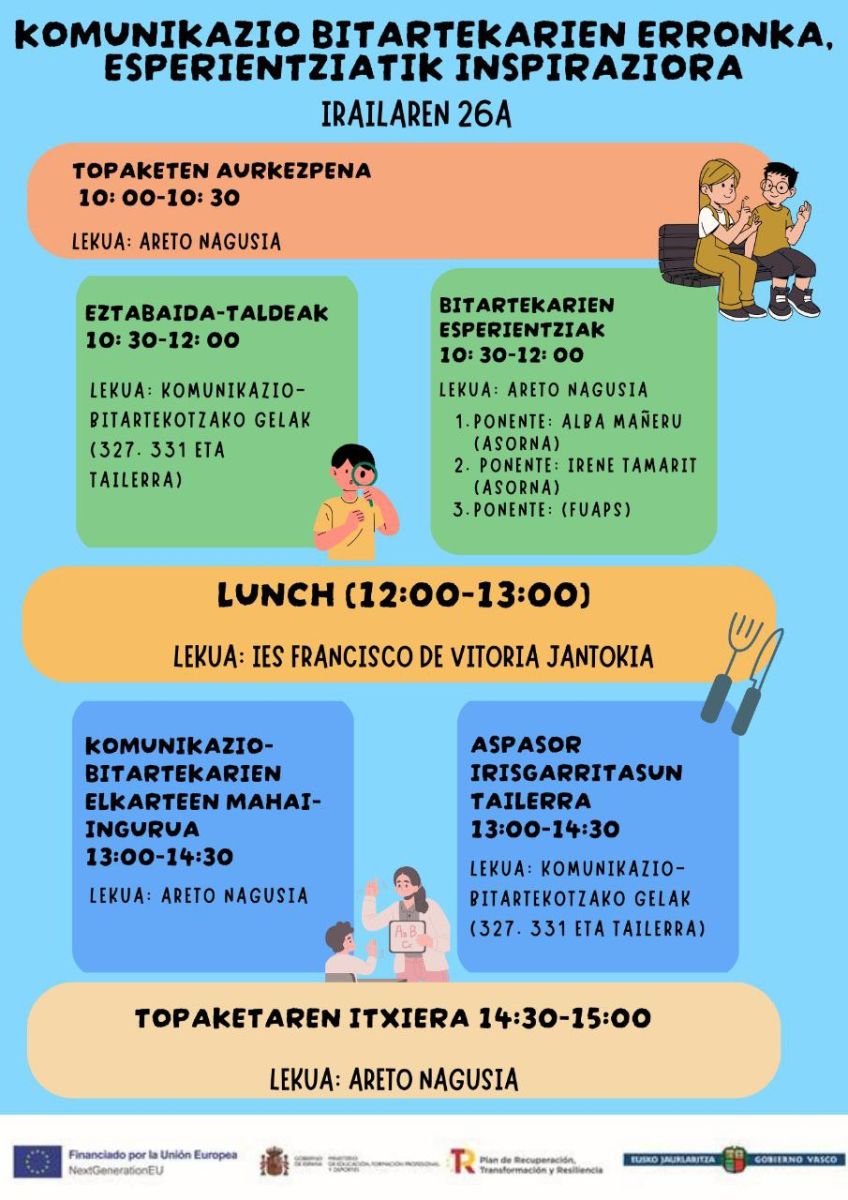
- People with communication difficulties and the obstacles that live in our society have low visibility. The work of the communication mediators trained in this area is unknown, helping people with difficulties to develop their skills, but also promoting social awareness for their accessibility for all. All of this and the needs of professionals in the sector are being reflected this Thursday in the First Meeting of Communication Mediators of Vitoria-Gasteiz.

People with autism, cerebral palsy, non-autonomous deaf people, with language disorders, with Down syndrome, with language loss due to dementia... Itxaso Viñe Minayo and Asun Zelaia Etxarri, a student and professor of the cycle of Communicative Intermediation of Vocational Training, have explained to ARGIA that the communication difficulties can be very diverse.
What does a communication mediator do? On the one hand, they work with people with communication difficulties to “develop their skills”, explains Viñe. On the other hand, they also work towards society, promoting awareness and transformation “so that society is accessible to all”. Finally, they perform “bridging work” between people and society in difficulty, with citizens, organizations or associations. “The communication mediator will always work within a multidisciplinary team,” says Zelaia: speech therapists, faculty, health personnel, psychologists, managers...
Basic professional demands
The work of communication mediators is very unknown in our society in general and the professional figure itself is relatively recent. With regard to Hego Euskal Herria, in Álava, Bizkaia and Gipuzkoa the cycle of Vocational Training in Communication Mediation (Vitoria-Gasteiz, Elgoibar and Barakaldo) was premiered last year, and this year in Navarra.
Vines and Zelaia have listed three main concerns. The first refers to a disorder that occurs “in society, in the market and in education”: to think that sign language is the same as interpretation and communicative mediation. But if the intermediaries work with different profiles, the interpreters only with deaf people, and within them, with communicatively autonomous people. This disorder causes two professional figures to share the same work bag on the educational lists of the Basque Government. Precisely, one of its main demands is the creation of two job exchanges specialising in education. This claim has long been launched by the Association of Sign Language Interpreters and Sign Language Interpreters of the Basque Country (ESHIE) and the Association of Communication Mediators of the Basque Country, Euskobi, has been added. The second main demand is the employment agreement for professionals in the sector. “We don’t have at the state or regional level,” says Viñas, surprised. Besides being a new figure, it can have a lot to do with the fact that it is a very feminized sector. “Of the 20 students from Vitoria, fifteen are women,” Zelaia explained.
What about society?
Viñas and Zelaia state that many things can be done to make society in general more accessible to people with communication difficulties, “most of them simple and cheap”. The first step would be to extend the concept of accessibility itself, which is currently very limited to physical accessibility. Consequently, the most important means are to avoid physical obstacles and braille for blind people. But the difficulties, and therefore the tasks, are many more. In buildings, for example, full signage should be taken into account. “Pictograms or graphic symbols, magnetic loops, orientation lines on the ground should be used...
Last year, the students of communicative mediation in Vitoria-Gasteiz analyzed five civic centers of the city and established proposals to improve accessibility. In order to make greater use of the work carried out, they were presented to the coordinators of the civic centers. In general, they found it “very interesting”, but they explained that they did not have time to apply it, that bureaucracy was also a problem... “If there is a working group in the City Hall looking at that, for example, what seems difficult would be easy.” It must be a global change, in any case, and for that, visibility and awareness go hand in hand.
Days
The conference aims to create a network in the educational community and to publicize the profile of the mediators. “That’s why we’ve invited students and teachers from Hego Euskal Herria, associations, unions and the Department of Education.” They will be held on Thursday, 26, from 10:00 in the morning and until 15:00 in the Hall of Acts of the Francisco de Vitoria Institute. Discussion groups will be formed and the experiences of mediators will be shared, or a round table of industry associations and an accessibility workshop will be held (below, programme poster).
